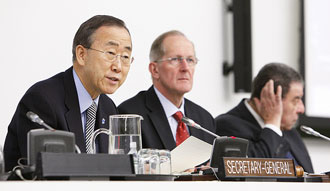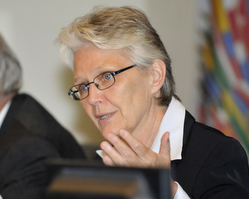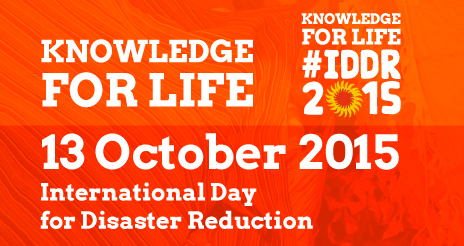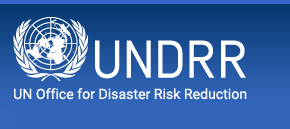- Our Mandate
- Mission and Objectives
- UNDRR in the UN
- Work Programme & Annual Reports
- Results Based System
- Work Partnerships
- Headquarters - Geneva
- SG-UN representatives for DRR
- Regional Office – The Americas and the Caribbean
- Head of the Regional Office – The Americas and the Caribbean
- What is Disaster Risk Reduction?
- What is the International Strategy?
- History of UNDRR
UNDRR in the UN System

PART OF THE UN FAMILY
UNDRR is part of the United Nations Secretariat.
UNDRR works with the wider UN system at headquarters and field levels.
At the headquarters level, it leads inter-agency country-specific and thematic discussions as well as contributes to the development of UN programming tools, such as guidelines on risk reduction for United Nations Development Assistance Framework (UNDAF) and post-disaster needs assessments. It regularly provides UN Country Teams with strategic and operational support for the development of country programs. It also develops a close partnership with the UN regional commissions, in particular the Economic and Social Commission for Asia and the Pacific (ESCAP) and Economic Commission for Latin America and the Caribbean (ECLAC).
UNDRR chairs the HLCP/Senior Management Group and oversees the Inter-Agency Group on Disaster Risk Reduction (IAG). The Group brings together all UN entities working in the area of disaster risk reduction.
Twelve UN organizations --FAO, UNDP, UNEP, UNFPA, UNHABITAT, UNICEF, UNOPS, WFP, WMO, WHO, UNESCO and the World Bank-- have prioritized disaster risk reduction in their 2014-2017 strategic work plans. They have included disaster risk reduction in their respective Results Based Monitoring Framework which represents a 70% increase in comparison to the previous work planning cycle.
UNDRR is working through the UN Development Group (UNDG) to anchor the commitments made in the UN Plan of Action in the guidance, capacity building and monitoring of the UN development work in countries. Initial successes include:
- UN System involvement in the operational development work as guided by the Quadrennial Comprehensive Policy Review (QCPR).
- Accountability of the UN Resident Coordinators in coordinating UN initiatives on disaster risk reduction in countries and the roll-out of the UN Plan of Action on Disaster Risk Reduction.
- Regional consultations on the UN Plan of Action at the country level.
- Work streams on the resourcing of the UN Resident Coordinator Offices, development of a monitoring framework and set of indicators for the UN Plan of Action.
At the Third UN World Conference on Disaster Risk Reduction, the HLCP/SMG organized a High Level Special Event titled, "Uniting Nations, People and Action for Resilience." It brought together the Executive Heads of key UN agencies to address some of the challenges of the UN System in its engagement with countries and partners to achieve the goals and priorities set out in the post-2015 framework for disaster risk reduction.
Margareta Wahlström is the United Nations Special Representative of the Secretary-General for Disaster Risk Reduction.
 Learn more about United Nations Special Representative of the Secretary-General for Disaster Risk Reduction
Learn more about United Nations Special Representative of the Secretary-General for Disaster Risk ReductionCreated in 2008, the functions of this post includes leading and overseeing UNDRR in the executions of its functions entrusted by the General Assembly (GA), Economic and Social Council (ECOSOC) and the Hyogo Framework for Action (HFA), as well as policy directions by the Secretary-General; facilitating the development and implementation of the Sendai Framework for Disaster Risk Reduction; overseeing the management of the Trust Fund for the International Strategy for Disaster Reduction; and carrying out high-level advocacy and resource mobilization activities for risk reduction and implementation of the HFA.
The Special Representative also ensures the strategic and operational coherence between disaster-reduction and humanitarian disaster preparedness and response activities, as well as socio-economic activities of the UN system and regional organizations.
UNDRR has also developed a unique partnership with the World Bank, in particular its Global Facility for Disaster Reduction and Recovery (GFDRR). It has also been developing close partnerships with regional international organizations around the world such as the Association of Southeast Asian Nations (ASEAN), Organization of the Islamic Conference (OIC), Pan American Health Organization (PAHO, Applied Geoscience and Technology Division of the Secretariat of the Pacific Community (SOPAC), Economic Community of West African States (ECOWAS), and African Union (AU).
UNDRR is also closely associated with a wide network of scientific and development organizations researching on disaster risk and monitoring risk information, which also support the preparation of the Global Assessment Report on Disaster Risk Reduction.
The various UN agencies and organizations committed to reducing disaster risks.
- The Food and Agriculture Organization of the United Nations (FAO)
- International Atomic Energy Agency (IAEA)
- International Labour Organization (ILO)
- International Organization for Migration (IOM)
- International Telecommunication Union (ITU)
- United Nations Office for the Coordination of Humanitarian Affairs (OCHA)
- Office of the United Nations High Commissioner for Human Rights (OHCHR)
- United Nations Centre for Regional Development (UNCRD)
- United Nations Convention to Combat Desertification (UNCCD)
- UN Development Operations Coordination Office (UNDOCO)
- United Nations Development Programme - Bureau for Crisis Prevention and Recovery (UNDP/BCPR)
- United Nations Economic Commission for Europe (UNECE)
- The United Nations Environment Programme (UNEP)
- United Nations Educational, Scientific and Cultural Organization (UNESCO)
- The United Nations Framework Convention on Climate Change Secretariat (UNFCCC)
- United Nations Population Fund (UNFPA)
- United Nations Human Settlements Programme (UN-HABITAT)
- United Nations High Commissioner for Refugees (UNHCR)
- United Nations Children's Fund (UNICEF)
- United Nations Institute for Training and Research (UNITAR)
- Office of the High Representative for the Least Developed Countries, Landlocked Developing Countries and Small Island Developing States (UN-OHRLLS)
- United Nations Office for Outer Space Affairs (UNOOSA)
- United Nations Office for Project Services (UNOPS)
- United Nations University (UNU)
- United Nations Volunteers (UNV)
- United Nations Entity for Gender Equality and the Empowerment of Women (UNWOMEN)
- World Food Programme (WFP)
- World Health Organization (WHO)
- World Meteorological Organization (WMO)
- The World Bank
- General Assembly
- Economic and Social Council (ECOSOC)
- The Chief Executives Board (CEB)
- The United Nations Development Group (UNDG)
- The Inter-Agency Standing Committee (IASC)
 International Day for Disaster Reduction #DIRD 2015 Knowledge for Life
International Day for Disaster Reduction #DIRD 2015 Knowledge for Life
More information
